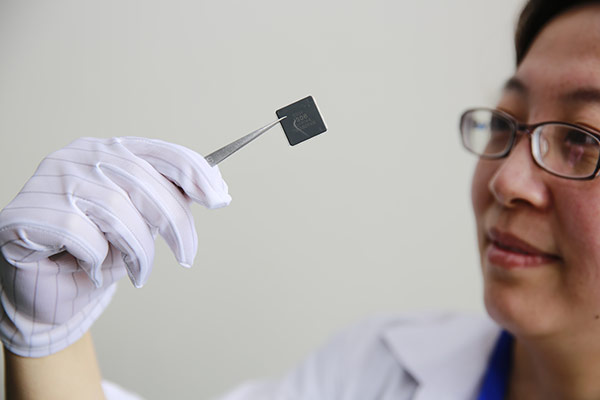 |
|
A technician displays a domestically developed chip in Jiujiang, Jiangxi province. Made-in-China chips generated $32.5 billion in sales last year. [ZHANG HAIYAN/CHINA DAILY] |
Overseas mergers and acquisitions will strengthen China's integrated circuit sector in the next five years, a top official said on Thursday.
Technologies and patents obtained through M&As are helping local vendors to catch up with international leaders and will be the cornerstone for China-based innovation in the future, said Diao Shijing, director of the electronic information bureau at the Ministry of Industry and information technology.
ICs, or chipsets, are semi-conductor wafers used in smartphones, airplanes and many other electronic machines.
The domestic IC market is expected to stay positive in the coming years, despite the slowing economy, Diao said, adding that the huge trade deficit in the sector has prompted China to grow its own providers.
The country spent more than $200 billion for importing chipsets in 2014, higher than the amount for oil imports during the same period. The central government has made IC design and manufacturing a strategically critical sector during the 13th Five-Year Plan (2016-20).
In comparison, made-in-China chips generated only $32.5 billion in sales last year, according to the ministry.
Chinese firms are already inking overseas investment deals to speed up the next-generation of chip design.
Tsinghua Unigroup Ltd, a Beijing-based enterprise, pledged to spend 300 billion yuan ($47 billion) over the next five years in a bid to become the world's third-biggest chipmaker. The company said last month that it was close to an investment deal with a United States chip firm.
Mobile chipmaker Qualcomm Inc holds the No 3 position in the global IC market, behind US giant Intel Corp and South Korea's Samsung Electronics Co Ltd.
Ye Tianchun, director of the Institute of Microelectronics at the Chinese Academy of Sciences, said China has been forced to develop its own chips due to the US embargoes on exports of high-end IC products.
"IC products are key components in the information era, especially as China is looking to develop its high-end manufacturing capabilities," Ye said. "Overseas acquisitions will definitely boost research capability of Chinese companies."
However, local players' advances are facing increasing headwinds due to weak demand.
Sales of electronics products in the first three quarters totaled 8 trillion yuan ($1.25 trillion), representing a 8.5 percent jump from a year earlier, according to the ministry. The growth rate during the same period in 2014 was 10.2 percent.
Chinese companies will need to compete with global rivals in higher-end markets for market share growth in the coming years, it said.
